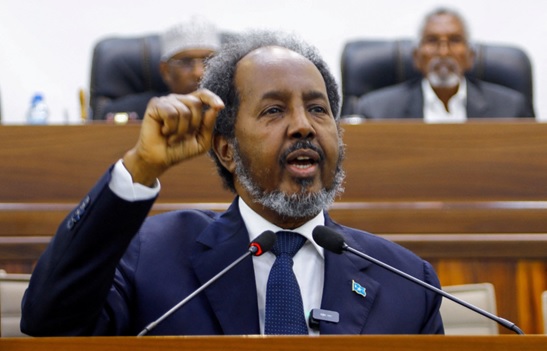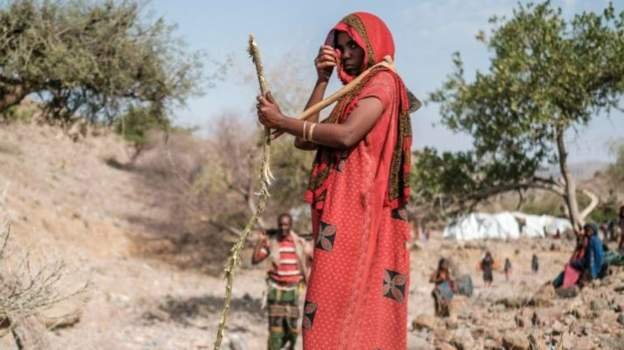By Abdullahi Ahmed Nor
The recent tripartite agreements signed in Asmara last week, which seek to align the interests of Somalia, Eritrea, and Egypt, initially appear to be a strategic step towards neutralizing Prime Minister of Ethiopia Mr. Abiy Ahmed’s ambitions to annex Somali coastal territory in the North. However, if we carefully assess the benefits Somalia might gain from this agreement, it becomes evident that Somalia is not positioned to capitalize on it due to its internal political fragmentation. The leadership of President Hassan Sheikh Mohamud, driven by self-interest and detached from public sentiment and the political elite, continues to pursue policies that deepen the divisions within the country.

President Hassan Sheikh Mohamud’s recent trip to Asmara to sign the tripartite agreement between Egypt, Eritrea, and Somalia occurred in the immediate aftermath of the catastrophic collapse of the 10th National Consultative Council (NCC) meeting. Given the situation, one would have expected the President to prioritize addressing the internal chaos within Somalia before rushing into international agreements. Unlike his counterparts, who have demonstrated a clear commitment to their countries’ interests, President Hassan seems detached from the realities facing Somalia.
President Ahmed Islam Madobe of Jubaland has consistently shown himself as a staunch defender of his state’s autonomy and the rule of law. His actions during the recent National Consultative Council (NCC) discussions, such as rejecting the proposed term extension of Federal Member State (FMS) mandates, demand the inclusion of Puntland FMS and Khatumo FMS as per the required quorum, are a testament to his commitment to uphold Somalia’s Constitution. By refusing the proposed extension of Federal Member State (FMS) mandates, which would violate Article 120 of the Provisional Federal Constitution (PFC), President Madobe has underscored the growing resistance against Mogadishu’s centralization attempts under President Hassan Sheikh Mohamud. His stand is seen as pivotal in safeguarding Somalia’s federal structure and rule of law.
Following the failure of the 10th National Consultative Council (NCC) meeting, Somalia’s political landscape has entered a more turbulent phase. Opposition voices, led by former presidents and prime ministers and opposition party leaders such as Abdirahman Abdishakur all unanimously supported the position of President Ahmed Madobe of Jubaland. Their voice has grown louder in protest against the Federal Government of Somalia’s (FGS) controversial decisions, particularly the extension of Federal Member State (FMS) mandates, the divisive new constitution, and the unrealistic promise of a one-person-one-vote system by May 2026.
The opposition camp, have criticized President Hassan Sheikh Mohamud’s actions as unconstitutional and self-serving. They argue that extending the mandates of FMS presidents, especially in a time of widespread instability, is a direct violation of Article 120 of the Provisional Federal Constitution (PFC). The extensions are seen as political favors designed to consolidate President Hassan’s power and influence over the federal states, further undermining the autonomy of the FMS.
The divisive nature of the new presidential constitution, which was introduced unilaterally by President Hassan and discarded the widely agreed-upon PFC, is another major point of contention. Opposition leaders argue that the president’s constitution centralizes power in the office of the president, eroding the federal system that is meant to balance power between the federal government and the FMS. They accuse President Hassan of systematically dismantling Somalia’s fragile democracy and replacing it with a one-man rule system that ignores the input of key stakeholders.

A major issue raised by the opposition is the unrealistic goal of implementing a one-person-one-vote system by May 2026. While President Hassan has promised this electoral reform as part of his vision for a more democratic Somalia, the reality on the ground makes it an impossible goal. The opposition leaders point to the continued presence of Al-Shabaab in vast swathes of the country, the lack of infrastructure, and the deep-rooted tribal divisions that make such an election unattainable. They argue that the promise of one-person-one-vote is nothing more than a political gimmick designed to extend President Hassan’s stay in power beyond his constitutionally mandated term.
Somalia is in no position to host future army deployments, as the country is embroiled in internal conflicts that have left its Federal Member States (FMS) either severed or severing ties with the Federal Government or consumed by endless clan warfare. The firearms distributed to clan militias during the now-defunct campaign against Al-Shabaab have further fueled this chaos. Hirshabelle FMS, for example, has split into Jowhar and Hiiraan, with multiple presidents and governors in Hiiraan alone, and militia groups are extorting money from truck drivers at numerous roadblocks. Meanwhile, Galmudug FMS is facing its own set of challenges. The region is plagued by inter-tribal conflicts that show no signs of resolution. These wars have destabilized the area, with contenders for the upcoming presidential election arming themselves heavily in preparation for the next political showdown.
In Southwest FMS, every district is encircled by Al-Shabaab leaving air travel as the only means of communication with the outside world. At the time of this writing, Ethiopian forces are fighting Alshabab in Bakool region. For the best part of 15 years the Ethiopian army mainly none ATMIS are the bulwark that stand between the people of SWS and Alshabab and in due course of time the Ethiopian army won the hearts of the people.
In Jubaland FMS, Al Shabab holds most of its territory to such an extent that the capital city of the FMS Bua’ale is the head quarter of Al Shabab. Kismaya, the provisional capital is surrounded by al shabab and the Gedo region would have fallen long time ago without the Ethiopian army who are holding Al Shabab at bay. Again, the people of Gedo region and their leadership have developed positive bonding with the Ethiopian army.
Puntland FMS severed ties with the FGS, unlike President Mohamed Abdullahi Farmajo, development funds from the International Community has been withheld for over a year, as President Hassan uses development funds as political leverage to extract favors from Puntland’s leadership. This manipulation of international funds, with the tacit approval of institutions like the World Bank (WB) and African Development Bank (AfDB), has further strained relations between the FGS and FMS.
In Mogadishu, the Al-Shabaab fighters hold significant influence, openly challenging the authority of the Federal Government. For instance, the FGS’s recent directive for businesses to install CCTV cameras to deter Al-Shabaab was swiftly countered by a directive from Al-Shabaab itself. As a result, those who complied with the government’s orders are now on Al-Shabaab’s hit list. Just recently, businesses in the “Ceelasha Biyaha” area were bombed and destroyed, and similar attacks have taken place in Mogadishu, where Al-Shabaab frequently targets business owners who defy their directives. Only yesterday, three businessmen in Dayniile District of Mogadishu were assassinated in a broad daylight in their shops by Al-Shabaab fighters.
In this volatile environment, Somalia under President Hassan’s leadership resembles a “quicksand,” threatening to swallow any foreign force that dares to step into this unstable territory. Rather than strengthening alliances through international agreements, the President’s failure to stabilize his own country and address the ongoing violence makes any external military intervention a risky and potentially disastrous venture. The challenges Somalia faces require a leader who is focused on national unity and security, not one who is rushing to sign international pacts all over the world while his country falls deeper into chaos.
President Hassan’s leadership is marked by actions that alienate key stakeholders, such as the nullification of the Provisional Federal Constitution (PFC), lack of justice, failure of holding the FMS together and the push for one person, one vote—a system that is clearly unfeasible in the current insecure environment. Moreover, the politicization of funds from the World Bank and the African Development Bank (ADB) has eroded trust in his administration. His divisive policies, rather than fostering unity, continue to drive federal member states (FMS) further away from the central government.
Given Somalia’s fragile state, the tripartite agreement could worsen the already dire situation. Instead of stabilizing the region, the deal risks emboldening Al-Shabaab by fostering greater discontent among Somalia’s FMS. Puntland has already severed ties with the Federal Government, and Jubaland appears to be on the brink of doing the same. The lack of effective national leadership is pushing these states closer to disengagement, undermining the very fabric of Somalia’s federal system.
Somalia’s potential disintegration seems more likely, especially considering the upcoming elections in Somaliland. If the Wadani Party secures victory as many predict, this could set off a chain reaction that may encourage Puntland, Somaliland, and Khatumo to explore a form of confederal arrangement, further weakening the unity of the Somali state. Should such a prediction materialize, it would be an unprecedented blow to Somalia’s territorial integrity and further isolate the Federal Government, rendering its authority nominal at best.
In light of these developments, the tripartite agreements, which could have been an opportunity for regional stability, might instead become another accelerant in Somalia’s fragmentation. The international community and Somali political elite must recognize the potential consequences of these agreements and the urgent need for inclusive national dialogue to prevent the disintegration of the country.
Conclusion
The situation on the ground, marked by rampant violence, clan warfare, and the unchecked influence of Al-Shabaab, demands immediate attention. If President Hassan continues to neglect these pressing domestic concerns, Somalia risks descending further into chaos. Without tangible efforts to restore national unity, reinforce the rule of law, and address the security challenges that plague the country, Somalia’s disintegration becomes a real and imminent possibility.
The international community, too, must reconsider its approach, as external military interventions in this volatile landscape may only worsen the situation. For now, Somalia remains a nation in peril, with its future hanging in the balance.
Abdullahi Ahmed Nor
Email: abdullahinor123@gmail.com


Leave a Reply